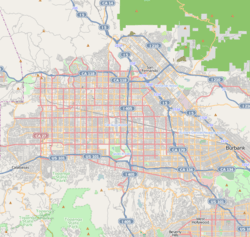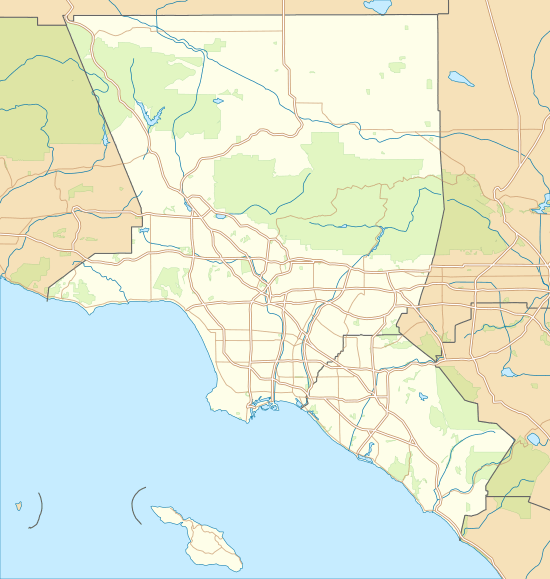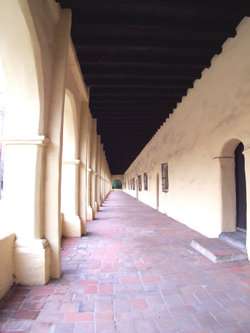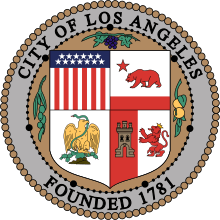Panorama City, Los Angeles
Panorama City is a neighborhood in the city of Los Angeles, California, in the San Fernando Valley. It has a generally young age range as well as the highest population density in the Valley. Ethnically, more than half the population was born abroad, a higher percentage than Los Angeles as a whole. Known as the valley's first planned community following a transition from agriculture to a post-World War II housing boom, it has produced several notable residents. Today it is a mixture of single-family homes and low-rise apartment buildings. Panorama City has three high schools, two recreational centers, a senior center, two hospitals and a chamber of commerce.
Panorama City | |
|---|---|
Neighborhood of Los Angeles | |
 Panorama City Location within Los Angeles/San Fernando Valley  Panorama City Panorama City (the Los Angeles metropolitan area) | |
| Coordinates: 34°13′29″N 118°26′56″Wƒim |
History

Panorama City is known as the San Fernando Valley's first planned community. In 1948, it was developed as such by residential developer Fritz B. Burns and industrialist Henry J. Kaiser.[1] The master plan was created by architectural firm Wurdeman & Becket.[2] Burns, seeing the tremendous potential fortune that could be made as large numbers of World War II veterans came home and started families, teamed up with Kaiser in 1945 to form Kaiser Community Homes. The vast majority of the houses were bought with loans issued by the FHA or the Servicemen's Readjustment Act of 1944, better known as the G.I. Bill.
Homes in the area were sold with racially discriminatory covenants. A "Conditions, Covenants, Restrictions" document filed with the county recorder declared that no Panorama City lot could be "used or occupied by any person whose blood is not entirely that of the white or Caucasian race."[3] Such restrictive covenants, which sometimes also limited ownership to people "of the Christian faith", were common in many communities at the time, and although rendered legally unenforceable by the Civil Rights Act of 1968 they may still be found on some older property deeds.
De facto integration was accelerated by the Community Reinvestment Act of 1977. The CRA-insured credit was provided to the entire community without regard to race or income, causing white flight as with many other areas of the San Fernando Valley.[4] During the period of desegregation busing, Panorama City was exempted due to its diversity.
In its history, Panorama City was once adjacent to General Motors'[1] largest assembly plant to date. Today, the Van Nuys Assembly plant has been replaced with a large shopping center named The Plant, which includes stores and restaurants such as Regency Theatres, Ross, Babies "R" Us, The Home Depot, Hometown Buffet, Blaze Pizza, In-N-Out Burger, Starbucks Coffee and others.
Geography
Panorama City touches Mission Hills on the north, Arleta on the northeast, Sun Valley on the east, Valley Glen on the southeast, Van Nuys on the south and North Hills on the west.[5]
For the most part, the community is a mixture of small single-family homes and low-rise apartment buildings.
Demographics
The 2010 U.S. census counted 69,817 residents in the neighborhood’s 91402 ZIP code. The median age was 30.1, and the median yearly household income at that time was USD$41,467.[6]
In 2008, the Los Angeles Times Mapping L.A. project described Panorama City as an area that was "moderately diverse" ethnically, with a high percentage of Latinos and a significant population of Filipinos. Filipinos and Mexicans were the most common ancestries in the neighborhood. At that time, the breakdown was Latinos, 70.1%; whites, 11.5%; Asians, 11.9%; blacks, 4.3%; and others, 2.2%. Mexico (52.1%) and El Salvador (13.4%) were the most common places of birth for the 55.0% of the residents who were born outside of the United States—a high percentage for Los Angeles.[7]
As of the 2010 census, renters were occupying 64.8% of the housing stock, while owners held 35.2%.[6]
There were 2,849 families headed by single parents. The rate of 20.2% was considered to be a high one. There were 1,837 veterans, or 4.3% of the population, a low percentage compared to the rest of the city and county.[7]
Parks and recreation
The Panorama Recreation Center is in the community. The center, which also functions as a Los Angeles Police Department drop-in facility, has an auditorium, a lighted baseball diamond, lighted outdoor basketball courts, a children's play area, a community room, an indoor gymnasium, picnic tables, and unlit tennis courts.[8]
The Sepulveda Recreation Center is located in Panorama City.[9] The center has two indoor gymnasiums, both of which can be used as auditoriums. The center also has a lighted baseball diamond, lighted indoor basketball courts, a children's play area, a community room, and lighted tennis courts.[10] The Sepulveda Pool is an outdoor unheated seasonal pool in the Sepulveda center.[10][11]
The Mid-Valley Senior Citizen Center is in Panorama City. The center has an auditorium, a kitchen, and a stage.[12] The building was originally a convalescent home. As of July 2000 the former convalescent home was being converted into the senior center.[9]
Government and infrastructure
The Panorama City Neighborhood Council is a city agency formed by volunteer elected officials and appointed officials. The purpose of the Panorama City Neighborhood Council is to provide an inclusive open forum for public discussion, and to serve as an advisory body on issues of concern to the Panorama City area and in the governance of the city of Los Angeles. The Council gained its official city role upon certification by the Board Of Neighborhood Commissioners on March 15, 2007.
Metro and LADOT operates fixed-route transit bus service in Panorama City. Metro Rapid lines 744 & 788 operates on Van Nuys Boulevard. Metro Local lines 152, 158, 166, 167, 169, 233, & 353 operates the community. LADOT operates DASH bus service on their Panorama City/Van Nuys route. In 2027, Metro will open the East San Fernando Valley Transit Corridor light rail project with stations on Van Nuys Boulevard at Nordhoff Street & Roscoe Boulevard.
Representation
- California's 29th congressional district
- California's 18th State Senate district
- California's 46th State Assembly district
- Panorama City Chamber of Commerce[13]
- Los Angeles City Council District 6
- Panorama City Neighborhood Council[14]
Economics
Panorama City was the largest center of major retail outlets in the San Fernando Valley, starting with the opening of what would later become the Panorama Mall in 1955. At the time, this small complex included The Broadway and five other stores.[15] Three other major department stores — Ohrbachs, J. W. Robinson's and Montgomery Ward – opened nearby over the next ten years, and they were marketed collectively as the Panorama City Shopping Center. By the 1970s, the area had lost business to nearby communities.[16][17] The freestanding Ohrbach's building, designed by the architectural firm Welton Becket and Associates, is significant in that it represents "an early and important phase of commercial development" in the neighborhood. It is now the site of the Valley Indoor Swap Meet.[18]
The Panorama Mall remains an important local mall, with a Walmart and Curacao discount stores, the latter catering to the Hispanic market.[19]
Education
Thirteen percent of Panorama City residents aged 25 and older had earned a four-year degree by 2000, an average percentage for both the city and the county. The percentage of the same-age residents with less than a high school diploma was high for the county.[7][20]
Schools within the Panorama City boundaries are:[21]
Public
- Panorama High School, 8015 Van Nuys Blvd.[22]
- Liggett Street Elementary School, 9373 Moonbeam Avenue
- Primary Academy for Success, elementary, 9075 Willis Avenue
- Valor Academy Charter, middle, 8755 Woodman Avenue
- Panorama City Elementary School, 8600 Kester Avenue
- Chase Street Elementary School, 14041 Chase Street
- Vista Middle School, 15040 Roscoe Boulevard
- Burton Street Elementary School, 8111 Calhoun Avenue
- Cal Burke High School, continuation, 14630 Lanark Street
- Ranchito Avenue Elementary School, 7940 Ranchito Avenue
- Michelle Obama Elementary School, 8150 Cedros Avenue
- Alta California Elementary School, 14839 Rayen St
Private
- St. Genevieve Elementary School, 14024 Community Street
- St. Genevieve High School, 13967 Roscoe Boulevard
Healthcare
Kaiser Permanente has a hospital and medical center complex on Woodman Ave. and Roscoe Blvd. serving the central and eastern San Fernando Valley. The complex covers three city blocks as a medical campus first opened in 1963. Mission Community Hospital is a private, for-profit hospital owned by Deanco Healthcare located on Roscoe Blvd. serving the neighborhood. Mission Community Hospital features a basic adult Emergency Room, surgical services, an inpatient psychiatric hospital, and inpatient medical services.
Notable people
- José Benavidez, boxer[23]
- Kirk Cameron, actor, Christian evangelist[24]
- Candace Cameron Bure, actress[25]
- Terry Gilliam, Monty Python member and film director[26]
- Meagan Good, actress[27]
- Mark-Paul Gosselaar, actor[28]
- Hopsin, rapper[29]
- Mike Shinoda, musician[30]
- Giancarlo Stanton, Major League Baseball player[31]
- Sara Velas, artist[32]
- Steve Wapnick, baseball player[33]
See also
References
- Najarro, Ileana (July 2, 2016). "Twenty-two years after Northridge quake, hope for a Panorama City neighborhood". Los Angeles Times. Retrieved 4 July 2016.
- "Panorama City | Los Angeles Conservancy". www.laconservancy.org.
- Colker, David (September 4, 1999). "Building a 'Future' in 1948". Los Angeles Times. Retrieved October 21, 2013.
- Avila, Eric (2004). Popular Culture in the Age of White Flight: Fear and Fantasy in Suburban Los Angeles. University of California Press. p. 41,235. ISBN 978-0-520-24121-3. Retrieved October 27, 2009.
- "Colored map" (PDF). Mapping L.A. Los Angeles Times.
- "Community Facts". United States Census Bureau.
- "Panorama City". Mapping L.A. Los Angeles Times.
- "Panorama Recreation Center." City of Los Angeles. Retrieved on March 20, 2010.
- Condon, Lee. "Destroyed Rec Center Rises Anew." Los Angeles Times. July 20, 2000. Metro Part B Zones Desk. 1. Retrieved on March 20, 2010. "the Sepulveda Recreation Center in Panorama City."
- "Sepulveda Recreation Center." City of Los Angeles. Retrieved on March 20, 2010.
- "Sepulveda Pool." City of Los Angeles. Retrieved on March 20, 2010.
- "Mid-Valley Senior Citizen Center Archived 2010-01-04 at the Wayback Machine." City of Los Angeles. Retrieved on March 20, 2010.
- "Panorama Chamber | Providing a voice and solutions to Business".
- "Panorama City Neighborhood Council". www.panoramacitync.org.
- "'Copter Takes Group To Broadway-Valley". Valley Times. October 10, 1955.
- "8 Oct 1964, Page 48 - Valley News at Newspapers.com". Newspapers.com.
- "Panorama City: Once vital business area awaits revival". Los Angeles Times. January 25, 1988. p. 24.
- "Report - HPLA". historicplacesla.org.
- "Valley La Curacao Store Earns Loyalty of Latino Customers by Speaking Their Language". Los Angeles Times. September 28, 1999.
- Less Than High School Ranking - Mapping L.A. - Los Angeles Times "Less Than High School," Mapping L.A., Los Angeles Times]
- "Panorama City: Schools," Mapping L.A., Los Angeles Times
- GreatSchools.com
- Mier, Saul. "Biography of Jose Benavidez jr". Top Rank. Archived from the original on 2011-07-17.
- Mansour, David (May 2005). From Abba to Zoom. Andrews McMeel Publishing, LLC. p. 64. ISBN 978-0-7407-5118-9.
- "Candace Cameron Bure Biography (1976-1876)". filmreference.com. Retrieved 2008-12-08.
- Plume, Kenneth. "Interview with Terry Gilliam (Part 1 of 4) - IGN". www.ign.com. Ziff Davis, LLC. Retrieved January 2, 2016.
- "DallasBlack.com: Interview: Meagan Good". DallasBlack.com. Archived from the original on 2009-01-23.
- "Ophronia Scott-Gregory and Monica Rizzo, "To Bell and Back," People, October 12, 1988". Archived from the original on November 9, 2014.
- Marcus Hopson. florida.arrests.org
- Apar, Corey. "Mike Shinoda: Biography". AllMusic.
- "Giancarlo Stanton Stats, News, Bio". ESPN.
- "Oct. 3: Sara Velas on The Velaslavasay Panorama". September 25, 2017.
- "Steve Wapnick Stats". ESPN.
External links
| Wikimedia Commons has media related to Panorama City, Los Angeles. |
- Panorama City Chamber of Commerce
- Panorama City Neighborhood Council
- Pacoima/Panorama City - CRA/LA
- "Panorama City: It's not about the past; it's about potential". Los Angeles Times. April 25, 2004. Real Estate section, Neighborly Advice column.
- Panorama City crime map and statistics

